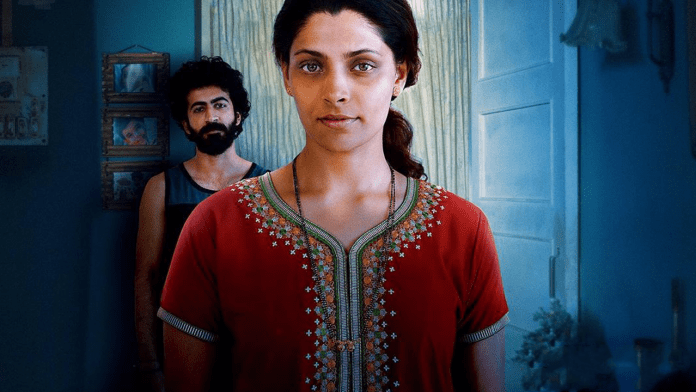Anurag Kashyap’s latest Netflix release ‘Choked: Paisa Bolta Hai’ is a critical take on money and how it mediates with every aspect of middle-class life. Touching upon demonetisation, corruption, emotional estrangement in relationships and community gossip, the film manages to draw a parallel between a clogged-up drain and the life of Sarita Pillai, the protagonist of the film.
The name of the film defines almost all the aspects that it attempts to touch upon. Although literally hinting to the choked kitchen sink that comes as a messiah to the family, the definitions of choked widen amidst Sarita’s past: her choked voice on the stage and her performance anxiety, Sushant’s identity choked among normative narratives of masculinity, and Mumbai’s middle-class life with nosy neighbours and the constant cash crunch that chokes both them and the relationship they share.
The Story
Based on a backdrop of Demonetisation and its horrors, the story traces the life of a middle-class couple, Sarita and Sushant, in their everyday struggles to make ends meet. Sushant as an absentee househusband is continuously targeted as an emasculate and faces gendered jokes in his apartment complex. Sarita, as a bank employee and the sole bread-winner of the family, faces a daily difficulty of fending for the family.
Frustrated at Sushant’s indifference towards the family, and her past failures, Sarita feels ‘choked’ in the relationship. However, when Sarita finds a secret stash of infinite cash in her house, she starts to think that things will change for the better. In the hope of paying off debts and making her and her family’s life better, she finds herself caught in a whirlpool of emotions, unfortunate proceedings and unexpected repercussions.
Kashyap’s style of filmmaking is both classical and innovative. With a voyeuristic camera, the viewer is led to see the most vulnerable moments of Sarita, when she crawls underneath the sink for grabbing more cash packets and when she reaches first in the bank to safely keep them without anyone noticing. To amplify the hauntings of Sarita’s past, Kashyap employs a jazzy, percussion-based soundtrack that purposefully reminds the viewer that all trials of her life revolve around one epic stage failure.
Performances
Saiyami Kher, as Sarita Shahasrabudhdhi Pillai, leads the film to its merits. The character’s determination, struggles and failures are aptly breathed to life by Kher. Roshan Mathew, as Sushant Pillai, brilliantly portrays Sushant’s intrinsic feelings of insecurity and inferiority.
The bend of his character-arc towards the end of the film is remarkably memorable. Amruta Subhash as the good-natured neighbour Sharvari Tai, Upendra Limaye as the cunning restaurant-owner Reddy and Uday Nene as the somewhat-selfish Dinesh, ex-business partner and carrom-friend to Sushant outdo their roles as supporting cast members.
Positives
The film, delicately yet strongly, serves the impact of the “historical” decision. Mixing politics into the daily humdrum, the film serves out a satire through the plight of the masses. In a scene where an old woman requests Sarita to let her withdraw money exceeding the daily quota, a curt reply follows, “bank mein paise milte hain, sympathy nahi”.
The impact is strongly felt when a wedding is almost on the verge of being jeopardised as the mother of the bride and Sarita’s neighbour, Sharvari Tai, sits in complete hopelessness while new notes vanish from banks as quickly as they had arrived. The chaos of the situation descends heavily on Sarita and is reflected through her mental toil and physical fatigue, blurring everything into a single state of despair.
Brilliant colour tones, a thrilling script, diverse characters and an underlying tone of political critique through Sarita’s repulsiveness towards Sushant’s idolisation of the Prime Minister is indeed well-crafted.
Negatives
Although the premise is promising and crafted well, the monotony of the plot seeps in like the dirty water from the clogged pipe in the film.
Sarita and her relationship dynamics with Sushant seemed unrealistically stifling, even the most basic conversations are routed through their son. Sarita’s excessive hardness on her husband and Sushant’s vulnerability echoes in the emptiness of character depth.
Construction of the community with gossip, petty neighbours and over-friendly office colleagues seemed shallow as there was not a single neighbour Sarita could open up to. Stereotypes like this was rather a put-down.
Worth it?
A rather average film from a fantastic filmmaker tries hard to make the demons of demonetisation being felt on middle-class living. However, with a plethora of parallel storylines and an unanticipated positive ending, the film leaves the audience ‘choked’ with a sense of overwhelming abruptness. Watch Choked if you’re curious to see how it pans out.
Also Read : Betaal review: Not too high on sense or scares

